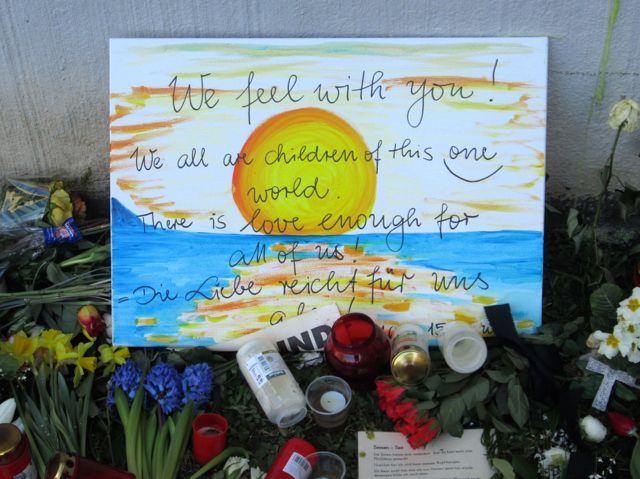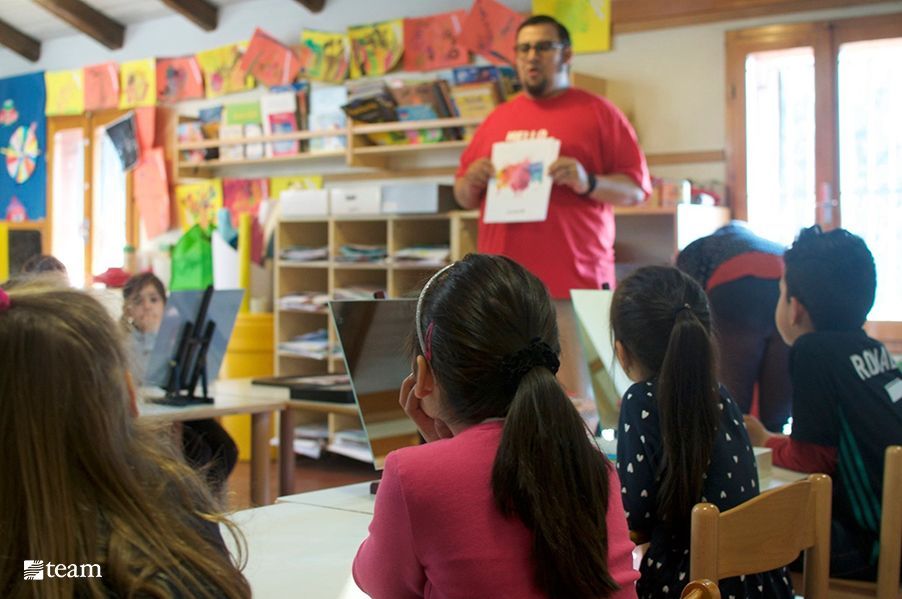Protests Lead to Refugee Ministry in Germany
After the tragic murder of Khalid, a refugee from Eritrea in Germany, two missionaries were called into action and found themselves intersecting with Khalid's story in a surprising way. Photo by Jeff Ingram
The global refugee crisis presents new opportunities for Christians to share the gospel in word and deed. As critical needs grow, TEAM missionaries continue to partner with the local church to welcome the nations arriving on their doorstep. This month we are sharing these testimonies and hope you will follow along on TEAM’s social media and blog.
Today, Jeff Ingram, worker in Germany, gives his first-hand account of an event that made headlines earlier this year and shares how God has continued to involve his family in refugee ministry.
One Monday evening in January 2015, my wife and I went mattress shopping in downtown Dresden. After plying the salesman with questions, we left the department store to catch the Nr. 9 tram home. As we exited the store, we found ourselves blocked in by six police vans parked bumper to bumper just outside the store’s door. We tried to squeeze between the bumpers to cross the street to the tram stop, while policemen in riot gear eyed us suspiciously.
Dresden has been making international headlines because of its burgeoning PEGIDA (Patriotic Europeans Against the Islamization of the West) marches, which calls for stricter immigration laws, particularly among Muslims. We were aware that PEGIDA had been holding its marches and demonstrations on Monday evenings—we just didn’t figure they would march down the street in front of the department store we were shopping at. Bad timing on our part.
In opposition, a group of about 100 anti-PEGIDA demonstrators ran right in front of us and sat down in the middle of the street, attempting to block the 25,000 PEGIDA marchers headed our way.
They chanted, “Say it loud, say it clear, refugees are welcome here!”
Just then an extremely large firecracker exploded. A group of policemen took off after some anti-PEGIDA demonstrators. Hundreds of PEGIDA marchers were filing by and the two groups began trading insults and yelling at each other. The atmosphere was tense, like a powder keg about to explode. At that point we decided to start walking to another tram stop—away from the demonstration—so we could get home safely.
The next morning we learned that a refugee from Eritrea, who lived just a 10-minute walk from our apartment, had been stabbed to death. Anti-PEGIDA supporters assumed quickly that Khalid’s murder was racially motivated and had probably been committed by a PEGIDA supporter.

“We feel with you!” The community rallied to demonstrate their support and remembrance of Khalid. Photo by Jeff Ingram
Before the police could even cordon off the crime scene, Dresden residents were placing candles and notes outside his apartment building. They even held a “Remember Khalid” march; thousands of Dresden residents participated. (As it turned out, Khalid had been stabbed by one of his own roommates after fighting about the household budget, a sad reflection of the hard lives and violent homelands of these young refugees).

R.I.P. Khalid
Photo by Jeff Ingram
There is a silver lining to this cloud of suspicion, misunderstanding, prejudice and fear in Dresden: The PEGIDA marches and Khalid’s murder have thrust the heart-breaking plight of refugees into the public spotlight. As a result, many Dresden residents have become aware of the immigration issues, responded positively and have been offering to get involved helping refugees.

Apartment buildings in Dresden.
Photo by Jeff Ingram
In the weeks prior to Khalid’s murder, my wife, Anne, had been walking through this neighborhood with its massive, communist-era block apartment buildings and praying:
“Lord, how do we get to know the people in these buildings? Surely most belong to the 80% of Dresden residents with no religious affiliation. What could we do to reach some of these people for Christ?“
As we began to read the newspaper reports and learn about this issues, Anne and I sent inquiries to city officials asking how we and perhaps our new church could get involved in refugee ministry personally. Not long thereafter, Anne and Ilona, a woman on our church planting team, discovered the SPIKE youth center located in the neighborhood where Khalid was murdered.

SPIKE youth center
Photo by Jeff Ingram
Anne hadn’t seen SPIKE on her prayer walk, but the Lord had already set up an opportunity there. On her first visit at SPIKE she helped three young Eritrean men practice German who, unbeknownst to her, had been Khalid’s roommates!
Two weeks later, Anne and I were invited to an informational meeting by the Kurdish-German social worker responsible for the 200+ refugees in our area. As a result of that meeting, we were asked to “adopt” or sponsor three small groups of Eritreans—the same men Anne had helped with German that first evening at SPIKE!
As we entered their apartment building for the first time to check out the stove that wasn’t working properly, we thanked God for answering our prayer: He was opening a door in the very neighborhood where Anne had walked and prayed. Not only that: We’re also providing a service to the city’s understaffed social workers who are working with limited resources to help scared refugees integrate into a city that isn’t sure it wants them.



TEAM's mission:
To partner with the global Church in sending disciples who make disciples and establish missional churches to the glory of God.
© TEAM 2023 | All Rights Reserved
Powered by
Solertiae Sites

















